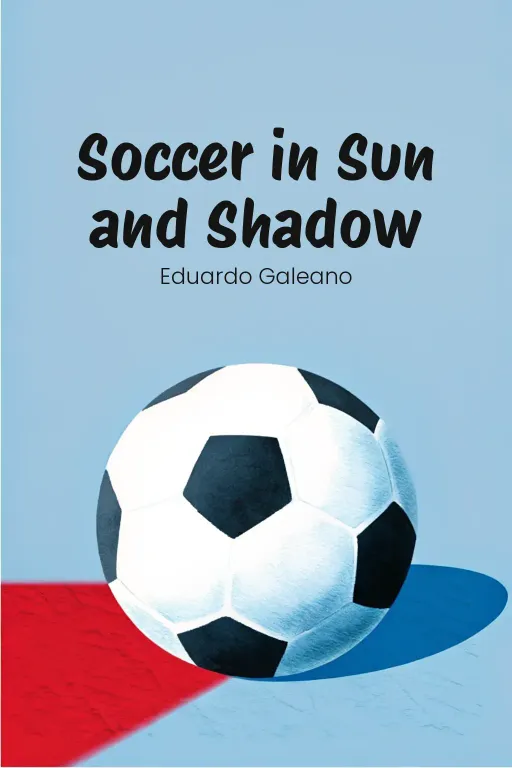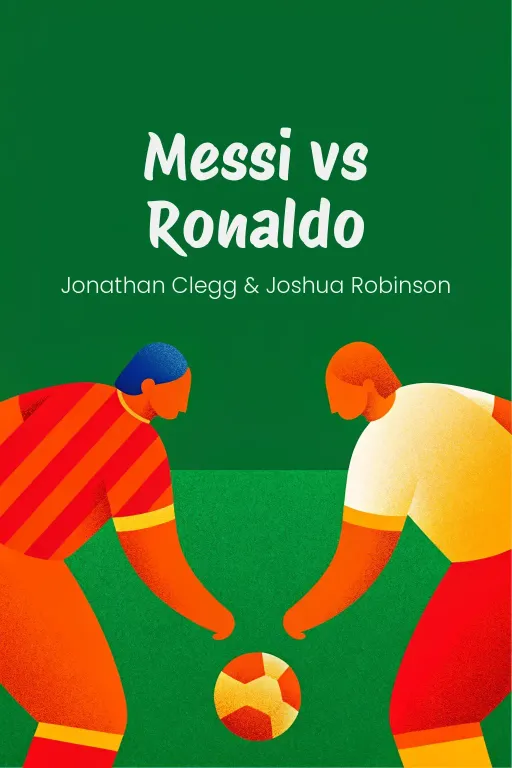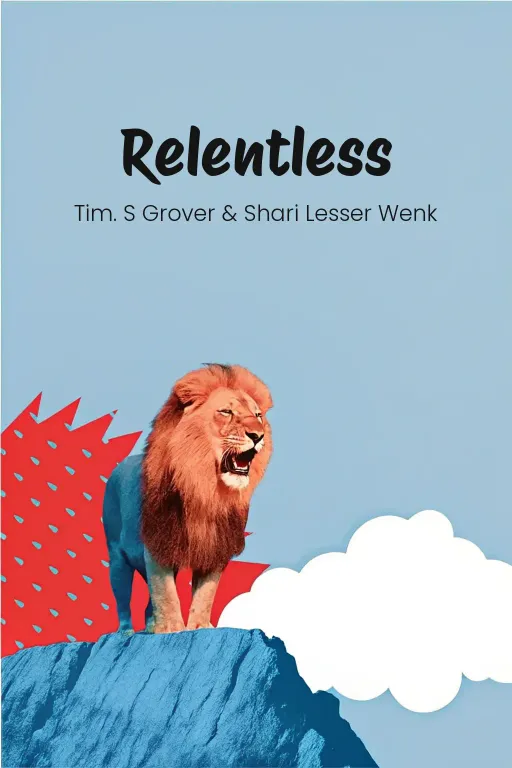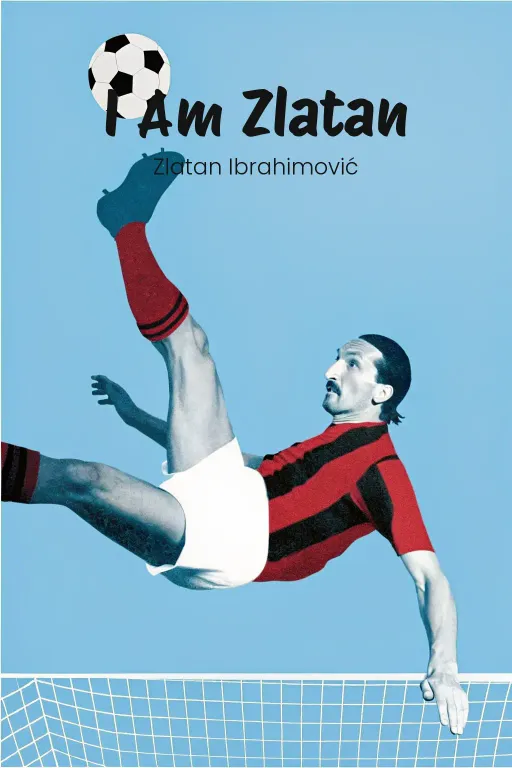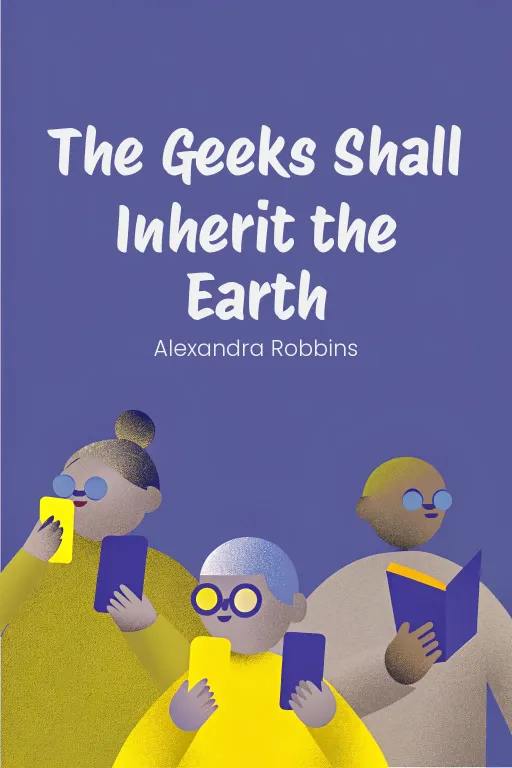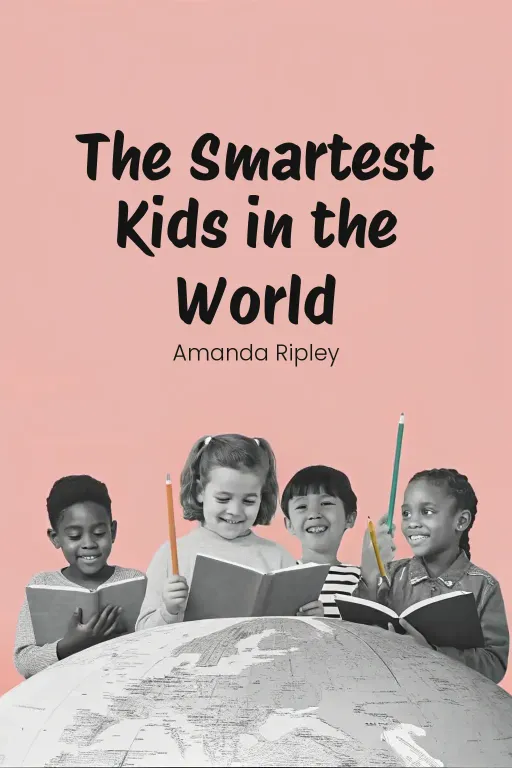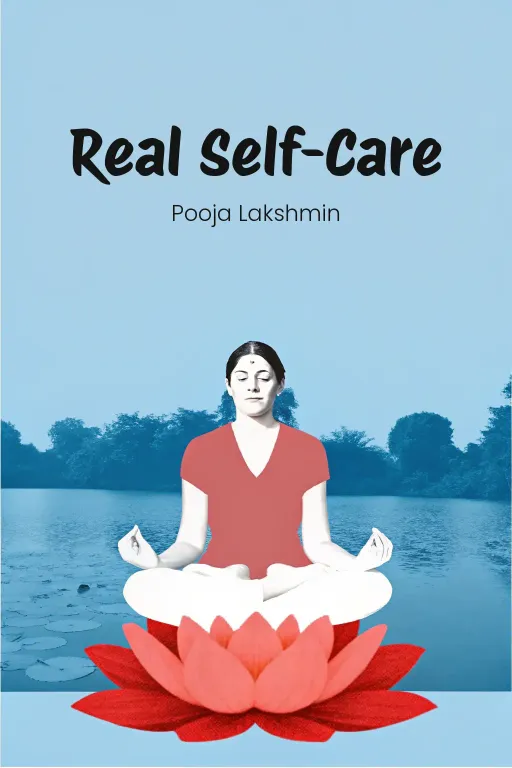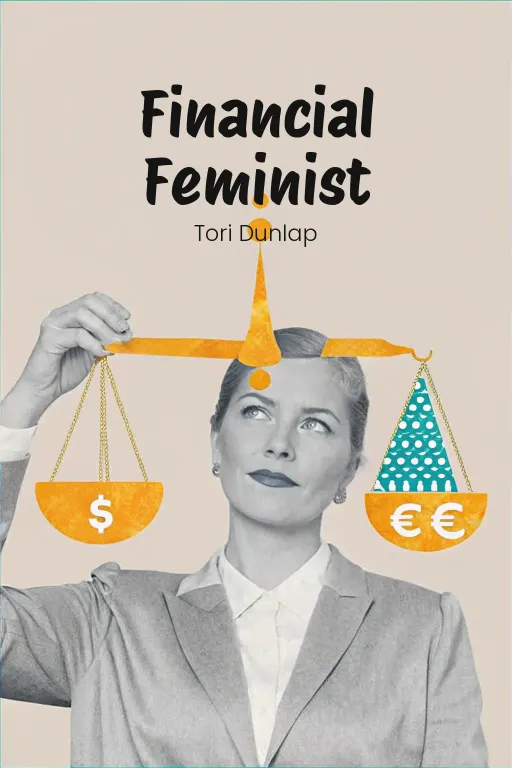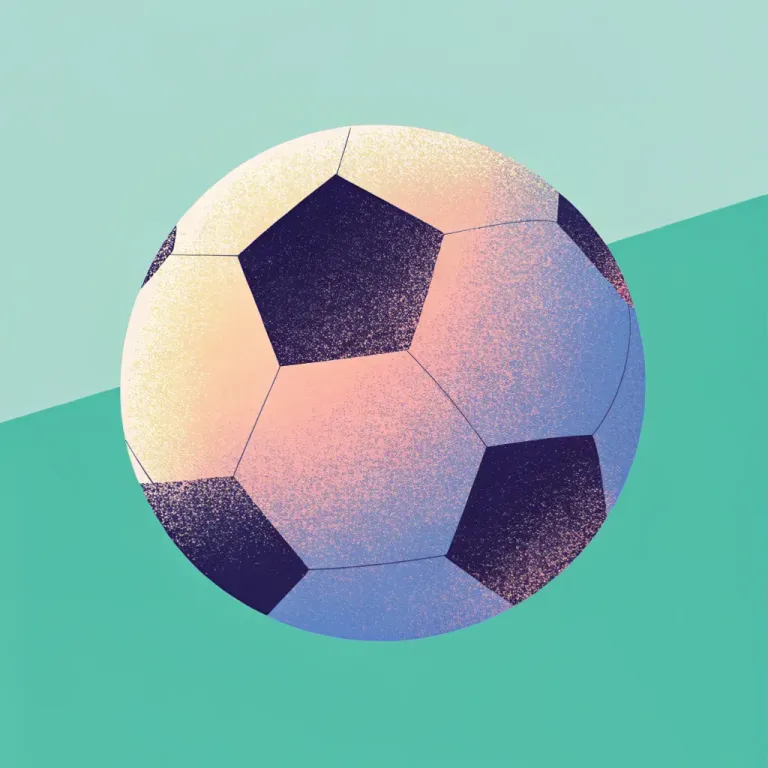
Beyond the Game: Soccer's Real Score
Podcast by Let's Talk Money with Sophia and Daniel
Beyond the Game: Soccer's Real Score
Part 1
Daniel: Hey everyone, welcome to the show! Today, we're lacing up our boots and heading onto the world's most universal stage: soccer. Sophia: Or football, depending on where you’re listening from. Either way, it's “the beautiful game,” right? And no book captures its soul quite like Eduardo Galeano’s Soccer in Sun and Shadow. Daniel: Exactly! Galeano's not just writing about goals and victories; he's telling the story of humanity through soccer. It's a poetic reflection on joy, pain, and everything in between! Sophia: And let’s not forget the shadows behind the sun, right? He delves into the darker side, too – the corruption, the politics, and how greed can threaten the sport's integrity. Daniel: Absolutely. And his writing doesn't just focus on the major events. He zooms in on the small moments – stories about legendary players, devoted fans, and unforgettable matches. It’s about the magic on the field and the real world off it, you know? Sophia: Which leads us to what we’re going to unpack today. We're going to explore three main ideas from the book. First, the historical and cultural roots of soccer—how it grew from street corners and public squares to the billion-dollar industry it is today. Daniel: Then, we’ll talk about the legendary players who defined eras. Not just with their skills, but as symbols of identity, resilience, and even rebellion! Sophia: And finally, we'll look at how soccer mirrors the world we live in – its inequalities, its beauty, and its ability to unite and, well, sometimes divide us. Daniel: So whether you're a die-hard fan or just curious about why this game captivates billions, this will be a journey into soccer’s sunlit joy and the shadows cast beneath it. Sophia: Alright! So, let's get started.
Soccer's Cultural and Historical Significance
Part 2
Daniel: Okay, let's dive into the historical and cultural roots of soccer. I find it incredible how kicking a ball can evolve and become so deeply intertwined with human culture. Think about ancient China's “cuju”, which was both entertainment and a display of military skill. Or those chaotic medieval games in Europe. Soccer's always mirrored our basic human need for play and community, hasn't it? Sophia: Yeah, those medieval games... sounded less like soccer, more like a free-for-all with a ball as the weapon. I mean, neighboring towns just bashing each other. Makes today's VAR debates look almost civilized. Daniel: Exactly! That chaos reflects what soccer was before rules – a raw expression of competition and camaraderie. The real game-changer was in England in 1863. Remember that? Representatives from different clubs met to bring order to the game. They separated it from rugby, and created the rules that still underpin modern soccer. Sophia: Imagine that – a bunch of folks hammering out rules in a pub! But, seriously, England took disorganized chaos and turned it into a structured game, then exported it around the world, alongside, shall we say, other aspects of the British Empire. Daniel: That's a crucial point. The spread of soccer wasn't just about the sport; it was about colonialism and globalization. South America is a great example. The British introduced soccer through sailors and expats, but it transformed into something totally unique. The "Creole soccer" style around the River Plate, in Uruguay and Argentina, shed that rigid structure and embraced improvisation and flair. That style became emblematic of the South American spirit. Sophia: That's where things get fascinating for me. This imported sport initially represented colonial power, and then South American communities subverted it. It became a tool for expression, even resistance. They took that Victorian order and said, "Thanks, but we'll play it our way." Daniel: Right. Soccer often mirrors bigger aspirations or resistance. Look at Pelé in Brazil. He grew up in poverty, playing barefoot with makeshift balls. He showed how soccer could break down socio-economic barriers. His artistry wasn't just athletic, it was cultural! He carried the hopes and identity of his community on his shoulders. Sophia: Pelé truly embodies what soccer means to so many. But, let's be real. His brilliance happened in a world where racial and class inequalities shaped the game. His rise, symbolic as it was, didn't erase those deep-seated problems. Daniel: Exactly. And that's what Galeano wrestles with in Soccer in Sun and Shadow. As much as soccer unites, it's also tied to societal hierarchies and economic structures. Look at the professionalization of soccer during industrialization. The working class built these leagues, but over time, many were priced out of enjoying it. Sophia: Yeah, let’s talk about that. You have employers encouraging workers to join soccer clubs, partly for their "moral and physical improvement." And those clubs gradually became professional giants, especially in Europe and South America. But with that came class divisions—Flamengo versus Fluminense in Brazil is the classic example, right? Daniel: Exactly. Flamengo historically represented the working class, while Fluminense reflected upper-class society. The rivalry between the teams wasn't just about soccer, it reflected broader class tensions. "Fla-Flu" derbies embodied these divisions in a physical, almost theatrical way. And this was happening everywhere. The consolidation of professional leagues created both opportunities and barriers, reinforcing inequalities while creating collective identity around soccer. Sophia: Which is weird because you get soccer being both a battlefield and a stage. People project their frustrations, hopes, and identities onto it – whether they're fans or players. And then, globalization kicks in and supercharges everything. By the mid-20th century, soccer's not just a game anymore; it's the world's common language. Daniel: The World Cup is a perfect example. Uruguay's victory in the 1930 tournament was more than just a sporting milestone; it was a statement of national pride for a small country asserting itself on the world stage. Soccer became about saying, "We matter." Sophia: And that's where soccer becomes almost mythological. These matches, these moments, they're more than entertainment. They're stories that nations and people tell about themselves. But, of course, soccer isn't isolated from power dynamics. I mean, Europe essentially built its leagues by taking talent from the Global South, right? Daniel: It's another shadowy side of the sport. African players, for example, often started as part of colonial sporting programs. Over time, their talent became a resource exported to European clubs. They were hailed as local heroes at home, but also symbolized exploitation and inequality. Sophia: It's like a microcosm of globalization itself. Soccer unites people in ways that few things can, but it also reflects and reproduces the inequalities of the world. Daniel: Which brings us back to Galeano's phrase: "shadowed joy." Soccer offers this amazing unifying beauty, but it can't escape the power structures and greed of society. And yet, it still has the capacity for magic for transcendence. For a moment, when you watch an incredible goal or move, all those shadows seem to disappear.
The Players and Their Identities
Part 3
Daniel: We’ve talked about soccer's history; now, let’s focus on the players themselves. Galeano “really” digs into their identities, and it's fascinating. By zooming in on these individuals, we can “really” transition into the more communal and emotional aspects of the game, connecting personal stories to bigger experiences. Sophia: Absolutely. Players aren't just athletes, are they? They're like symbols, underdogs, heroes, and sometimes, tragic figures. You can't talk about soccer without talking about the people who, well, make it magical, right? And Galeano does such a great job of bringing their stories to life. Daniel: Exactly. He explores that turning point in a player's life—how a childhood filled with the joy of just kicking a ball around can morph into the immense pressure of professional soccer. Look at Pelé, for example. He started with practically nothing, just a ball made of rags, playing barefoot in the streets of Brazil. That pure joy, that simplicity, you know? Sophia: Yeah, but it didn’t stay simple for long, did it? Galeano points out that Pelé’s incredible rise to fame—debuting in the World Cup at 17 and just dazzling everyone—came with a price. Those huge expectations must have turned that freedom into a constant need to be perfect. Daniel: Exactly. Pelé wasn't just playing anymore. He became a global icon, a commercial entity. Galeano touches on how the endorsements and media appearances began to consume him. His talent was celebrated, but it also commodified him, if that makes sense. Every goal, every winning performance was both a triumph and a new burden. Sophia: It's like he was playing with this invisible weight on his shoulders. Fans adored him, but they expected so much. Speaking of which, it’s not just Pelé's story, is it? We see this with Diego Maradona, too, right? Another kid from a poor background, this time from Argentina, who rose to stardom. But talk about fame being a double-edged sword… Daniel: Maradona's story is so layered. On one hand, you have the "Goal of the Century" in the 1986 World Cup—just breathtaking genius. On the other, there’s the infamous “Hand of God” in the same match—blurring the lines between brilliance and, well, cunning. Both are part of his identity, this combination of genius and rebellion. Sophia: Exactly, and as much as his talent was celebrated, he paid a brutal price for it. Addiction, constant scrutiny, and carrying the hopes of Argentina on his back—it all took its toll. He was lionized and crucified by the same public. That contradiction “really” shows how soccer can elevate and crush individuals, sometimes at the same time. Daniel: Galeano “really” captures that tension, doesn't he? He doesn't just idealize these players; he humanizes them. They aren’t just icons—they’re flawed, vulnerable people navigating a world that often demands more than it gives. And it’s not just the outfield players; think about the goalkeeper, whose role Galeano examines with so much feeling. Sophia: Goalkeepers—the loneliest players on the field. I love Galeano’s description of them as “condemned to watch the match from afar." Everyone else gets to share in the glory, but for goalies, one mistake can undo everything. It's a position that breeds isolation and, strangely, philosophy. Daniel: Absolutely. That solitude forces a depth of thought and resilience. Galeano describes goalkeepers as being the scapegoats. Even when someone else screws up—like, say, committing a foul that leads to a penalty—it’s the goalkeeper who bears the brunt. But then you have someone like José Luis Chilavert, who “really” defied those stereotypes. Right? He not only saved goals but scored them, taking penalties and free kicks, challenging what people thought a goalkeeper could be. Sophia: Chilavert was all defiance, wasn’t he? But he's an exception to the rule. Most goalkeepers? It's just you, the ball, and a stadium full of eyes watching your every move. That kind of exposure can either make you or break you. So, Galeano “really” captures the tragedy of the position, doesn’t he? It’s kind of a metaphor for life’s responsibilities, don't you think? Daniel: Absolutely. And that’s something soccer does so well: turning individual experiences into a reflection of universal struggles. Think about Garrincha, Brazil’s beloved winger. He had physical deformities—his legs were bent—but he overcame them with creativity and a love for the game. He played with joy and flair. But, despite his brilliance, his life off the pitch was troubled. Sophia: Garrincha’s story is, yeah, devastating. Despite bringing so much joy to fans, his personal struggles were just immense, and they grew with fame. He’s almost like the embodiment of the “shadowed joy” Galeano talks about—the way soccer can lift you up but not always save you from yourself. Daniel: Exactly, and then there’s the tragic case of Abdón Porte. His story is less well-known, but it's equally powerful. Porte was a loyal midfielder for Nacional in Uruguay, and he gave everything to his team. But when he thought his role was diminishing, he tragically took his own life. It’s a reminder of how deeply a player’s identity can be tied to their place in the game. Sophia: It’s incredible, and, yeah, heartbreaking, to think about the emotional toll soccer can take. For all the joy, there's such vulnerability when a person's entire sense of self is consumed by the sport. Stories like Porte’s and Garrincha’s “really” add to the narrative, don’t they? Galeano doesn’t let us forget that while soccer creates community and beauty, it can also be isolating and unforgiving. Daniel: That's why Galeano's work resonates so deeply, I think. He doesn't give us a romanticized view of the sport; he gives us the whole picture—the highs and lows. These individual player journeys, from their euphoric beginnings to their often complex endings, “really” mirror the struggles and triumphs of life itself. Soccer, like humanity, is both flawed and beautiful, isn't it?
Soccer as a Mirror of Society
Part 4
Daniel: You know, beyond just the players themselves, the incredible passion of the fans and how deeply they connect with the game really shows another level of impact that soccer has. Like Galeano so beautifully puts it, soccer really is more than just a game—it's a reflection of our society. And through that lens, we see so many different threads woven together: history, personal stories, and even systemic issues. You see it in how different governments have used the game for their own purposes, or how it shows the racial and economic struggles that exist, and even how globalization and commercialization have changed the game. Sophia: Exactly. Soccer really does hold up a spotlight to some of our best and worst behaviors, doesn't it? I think we have to start with how it's been used politically because nothing shows the duality of soccer better than how it can be used for both unity and, well, oppression. Take the 1978 World Cup in Argentina, that's a chilling example, right? The spectacle was clearly masking something much more sinister. Daniel: Absolutely. The timing of that particular tournament wasn't a coincidence at all. Argentina was under a military junta at the time, during the "Dirty War" period. The regime definitely used the World Cup as a way to create a false image, making the country look happy and successful, while thousands were secretly being imprisoned, tortured, or just made to disappear. Can you imagine? Cheerful, packed stadiums, just miles away from secret detention centers where horrible things were happening. Sophia: It's just staggering to think about, isn't it? The intense contrast between national celebration and human suffering. I mean, what better way to distract people than with a massive party centered around something they love? Soccer became a form of propaganda on an international stage, with the dictator Videla proudly showing off what looked like a united front to the world. Daniel: And that's the “really” sad part, isn't it? Soccer's power to unite, to create pride and joy, that can be so easily taken advantage of by those in charge. Galeano writes about how authoritarian regimes are drawn to soccer because it provides a distraction, a convenient narrative. All that intense patriotism tied to a team's success? It blinds people, even if just for a little while, to the issues that exist in their society. That victory over the Netherlands in the final, for example, wasn't just a win—it became a symbol of the junta's manufactured pride. Sophia: But for the fans, that probably wasn't the calculation, right? They were cheering because they loved the game, not because the government told them to. I guess that's the tricky thing about soccer, isn't it? It's hard to separate genuine emotion from manipulation. Daniel: That's so true. But it's not just politics that exploits soccer. Sadly, racial and economic inequalities have been part of the game since it started. Take Artur Friedenreich, for example, Brazil's first Black soccer superstar. He should've been celebrated everywhere as a pioneer of the sport, but his career was constantly affected by racism. Sophia: Friedenreich's story is “really” a series of contradictions, isn't it? His very existence challenged Brazil's racial hierarchy at the time—the son of a German father and a Black Brazilian mother absolutely dominating a sport that was initially only for white elites. He was literally dribbling past expectations and prejudices on and off the field. Daniel: And he thrived despite all those barriers. Friedenreich's genius was not only his skill, but also how he changed the game. Yet, even with everything he accomplished, he was often left out of Brazil's national team because of racism; racially charged ideas of who should represent the nation influenced all those decisions. Sophia: So, even though soccer claimed to be a game for everyone, it “really” wasn't. Friedenreich was changing history with his own talent, but was constantly facing obstacles from the very organization he helped elevate. Daniel: And that's the contradiction, between how soccer is presented as available to everyone, and the fact that it is also full of systemic inequalities, that comes up again and again in Galeano’s writing. Even today, players from poorer backgrounds face immense challenges navigating a system that so often seems to value profit over genuine support. Sophia: And speaking of profit, we have to talk about how commercialized soccer has become. I mean, this sport was once fueled by local passion, and now it's covered in sponsorship logos and run by huge corporations. Now, clubs aren't just clubs, they're multinational businesses. Daniel: It's definitely a worrying trend. You can tell Galeano “really” feels the loss of soccer's innocence. These days, it's shaped more by television deals and money than the heart and soul it originally had at the grassroots level. Look at Juventus in Italy, or even Manchester United—teams that were once deeply connected to their communities, but are now basically brands under these global conglomerates. Sophia: Or what about teams that are just outright corporate creations? Remember the Japanese team, Jef United Ichihara, that was owned not out of love for the game, but as a PR move for Furukawa Electric? That “really” says it all. The players weren't athletes with dreams, they were, for lack of a better term, assets in the company's portfolio. Daniel: And we can't forget the growth of broadcasting rights. Between 1960 and 1992, the profit from TV rights increased by over 600 percent! This basically turned sporting federations into television executives. The focus completely shifted—teams weren't just trying to win trophies anymore, they were competing for the most sponsor-friendly image. Sophia: And the fans feel that, too. Ticket prices have exploded, merchandise is being pushed everywhere, and the connection that was once local and familiar is becoming more and more out of reach. The relationship between clubs and their supporters is more distant, transactional, even. Daniel: Galeano keeps coming back to this loss of intimacy in his stories. Yet, even though he criticizes how soccer has been exploited commercially, he never forgets how transformative it can be. I mean, the fact that a simple game can show us such complicated truths about power, unity, and inequality, that's “really” a testament to how important it is. Sophia: Exactly, that paradox is what makes soccer so endlessly fascinating. It mirrors the best and worst of society. And honestly, no matter how much the sport is overshadowed by politics or money, you can’t deny its ability to still bring people together. For ninety minutes, it can make everything else disappear.
Conclusion
Part 5
Daniel: So, after diving into Galeano's “Soccer in Sun and Shadow”, what have we really learned about the beautiful game? We've seen how it evolved from a simple street game to this massive global phenomenon, right? It's become so deeply ingrained in cultures everywhere. And it's more than just a sport, isn't it? It's a way for people to express their identity, their resilience, their creativity, you know? Whether it's through legends like Pelé or the spontaneous, improvisational style of South American teams. Sophia: But we also faced the darker side of the sport, didn't we? How it's been used by political regimes, how commercial interests have, let's say, diluted some of its original spirit. Soccer really mirrors the inequalities and power struggles that exist in society at large. But despite all that, it’s also a platform for resistance, for people to come together, and, yes, for genuine joy. Quite a paradox, really. Daniel: Exactly! That duality is what makes it so captivating, right? The beauty alongside the contradictions. Like Galeano says, it's a game of "shadowed joy." Every amazing goal, every incredible play carries the weight of this complex world we live in. Sophia: Which begs the question: as fans, what do we choose to see? The shadows or the light? Because soccer's strength lies in the narratives it tells, and what we take away from those stories affects how we experience the game and how we engage with the world beyond the stadium. So, how do we translate these insights into, say, our everyday lives? Daniel: Well, next time you're watching a game, let Galeano's thoughts kind of simmer in the back of your mind. Think about what that ball actually represents. Not just for the players, but for the entire society watching. What hopes, what conflicts, what dreams are being played out right there on that field? Sophia: And remember, whether it's in the sun or the shadow, soccer is a universal language, a space full of possibilities. Galeano famously said, "Play as if you had never grown up." Maybe the true beauty of the game is that it allows us to keep that sense of childlike wonder alive, wouldn't you say? Daniel: Couldn't agree more, Sophia. So, until our next conversation, I hope everyone finds moments of magic both on and off the field!
